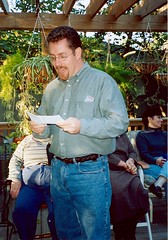Community Intelligence and the Library Role
Found this article about Community Intelligence (what I like to call Library-Initiated/Sponsored/Created Community Information) by Jennifer Rice on her What’s Your Brand Mantra blog the other day ... for those of you who hate to think of libraries within the same context as business, you might want to read something else (even though you are the ones who need this the most) ...
Jennifer mentions an article in Reveries in which Yahoo’s Jeff Weiner talks about the “evolution of search” writing itself as a play in three acts. Act One is the story of the public web ... what we’re all used to browsing and searching using our search tool of choice; Act Two is the story of our own private hard drives ... searched and browsed locally with tools that may in the future become part of Act Three; and Act Three is the story of community searching ... “where the results are improved based on the successes of other people’s searches for the same information.”
I personally think that this plays perfectly into the whole Library 2.0 thing, as our organizations seek to become less about being the container for information (an idea that shifted long ago, at least in Internet years) and more about facilitating the creation, access, upkeep, and renewal of locally relevant content.
I’m not a tool creator ... but an adopter of tools ... I’ll use what someone else creates to get my work done, and I’ll switch tools depending on my (and my users’) needs. And, of course, I’m a librarian, so I love the idea of libraries using whatever technology is available to help real people turn information into knowledge and then turn knowledge into action that changes the their lives and their worlds. And it’s really not that hard ... we just have to decide to do it.
Stuart Hinds, one of our web content developers and a local history librarian of some renown, thought it would be cool if we developed a DSpace-y type set-up for local citizens to save the stuff they want to have available to then always ... a big hard drive for locally created content. The academic world has already embraced this approach and we could too ...
And what if we focused on being the binding tissue that enables peer-to-peer sharing and indexing (there’s an ‘ole timey word) of locally relevant content ... what if ... instead of focusing our efforts on creating new library-specific tools, we focus on getting people to contribute ideas, questions, things that inspire others, and activities that result in community engagement. Training and encouraging folks to share content for the betterment of communities using existing (and relatively mature – it’s all relative!) technologies seems to me a great fit for our skills and positions in the community.
If we do that, we become the library for the next generation ... active ... involved ... distributed ... and conversant in the whats, whys, and hows of the whole information-to-knowledge-to-engagement thing ... in the words of Jennifer Rice ...
“You might consider thinking of your business as a facilitator instead of an
all-knowing entity that must retain control over every aspect of the business.”
Amen.


0 Comments:
Post a Comment
<< Home